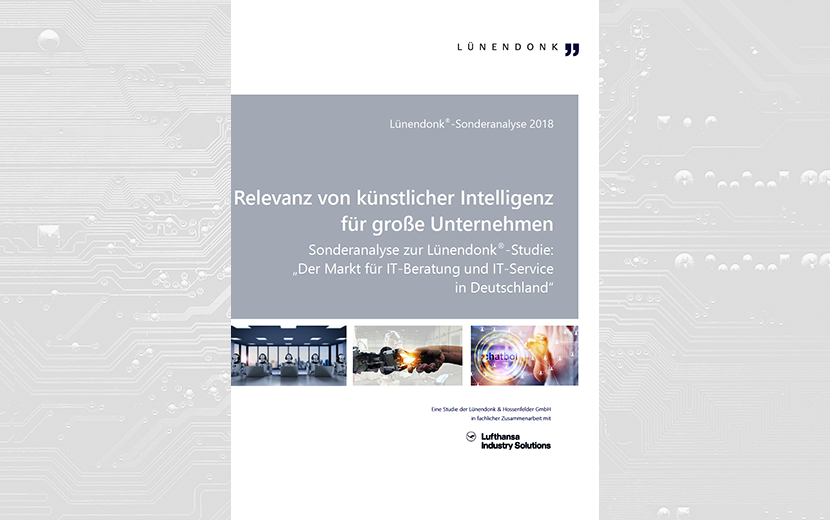AI technologies are already a fixed element of daily life in the form of chatbots, autonomous driving aids and voice assistants. However, companies can still derive even more benefit from the technical possibilities of AI. This detailed special analysis shows what the prerequisites are and how German companies think they are positioned.
The Lünendonk® 2018 special analysis: “The relevance of artificial intelligence for large companies”
Humans and machines are growing closer
Regardless of whether it’s the logistics industry, the manufacturing sector or customer communications, artificial intelligence is more than an issue for the future – it has long since arrived.
Digital business models are being developed, communication solutions are being found, and processes are being automated. With the possibilities that AI opens up, every sector is now on the brink of a minor revolution. Nevertheless, not all companies have been engaging with the matter to a sufficient extent. The level of digital maturity still leaves plenty of room for improvement, particularly at small businesses.
How can companies identify application scenarios and incorporate AI technologies into their business strategies? These questions must be answered for companies that wish to remain competitive on the market. Human-machine interaction will grow closer and closer in all sectors, and experts believe there is no alternative.
The study contains
- detailed figures and in-depth analysis on the relevance of AI for large companies and the options available in different sectors,
- estimates on the integration of AI elements in company strategy – now and in the future,
- findings on possible areas of application and potential for AI, and
- insights into the biggest challenges for applying AI technologies and factors that are getting in the way of implementing them at businesses.
Discover more about the opportunities and potential of AI technologies in this special analysis (only available in German).
The study was carried out by market research and consulting firm Lünendonk & Hossenfelder in collaboration with Lufthansa Industry Solutions.

Opportunities for enhanced efficiency and improved customer communication
Seventy-four percent of companies believe that AI technologies harbor great potential when it comes to taking over routine tasks. Robotic process automation, machine learning, and image and text recognition software are just some of the technologies available to industrial companies and logistics service providers who want to exploit the potential of Industry 4.0. Banks and retailers also stand to benefit from these same technologies. In the realm of customer communications, 80 percent of respondents expect that digitalization could lead to improved customer touchpoints through chatbots and service hotlines and at the point of sale. Understandably, this is primarily relevant to companies in the retail sector, which is why 92 percent of them regard AI as having potential to improve their business. However, only a few companies (32 percent) believe that AI can improve product quality and customer satisfaction. In this regard, some opportunities that will be significant in the future have been neglected.

Voice assistants, automation technologies and predictive analytics – AI in use
AI technologies are already in use. This is most often the case with voice assistants. At the time of the study, 68 percent of the companies surveyed were already using voice assistants – in customer contact, for example. Although most of them are not currently using such technologies, logistics companies want to make upgrades in this regard in the future. At 78 percent, manufacturing and banking are the front-runners here. Sixty-two percent of all companies are focusing on automating business and IT processes. Sixty-six percent see the greatest future potential in automation processes. The third large area of application is predictive analytics, which was used by 58 percent of companies at the time of the study. Fraud detection and customer segmentation are the most frequent areas where it is being deployed.

Obstacles to the use of AI technologies
Of course, there are a number of challenges associated with the use of AI technologies. For example, 68 percent of companies are concerned about protecting sensitive customer data. They fear that the use of AI technologies could result in security gaps. In retail and logistics, this is a barrier to 77 percent of companies. Another factor mentioned by 60 percent of respondents is data quality, which appears to be insufficient for complex AI applications. In addition, 42 percent of workforces are concerned the advancements in digitalization will lead to job losses.
To see all the results in detail, click here to download a free PDF of the Lünendonk® 2018 special analysis “The relevance of artificial intelligence for large companies” (only available in German).
You can read the key findings and full evaluations in the special analysis, which you can download for free (only available in German). Below are some of the study’s most relevant insights.


